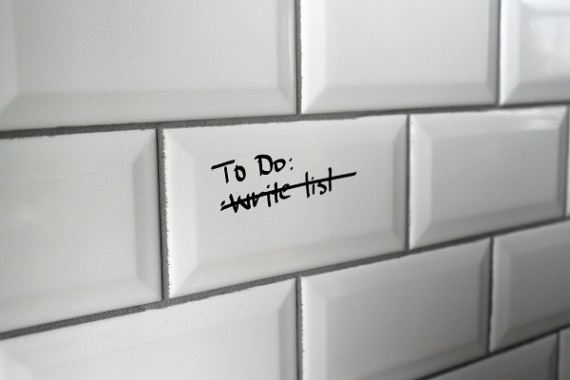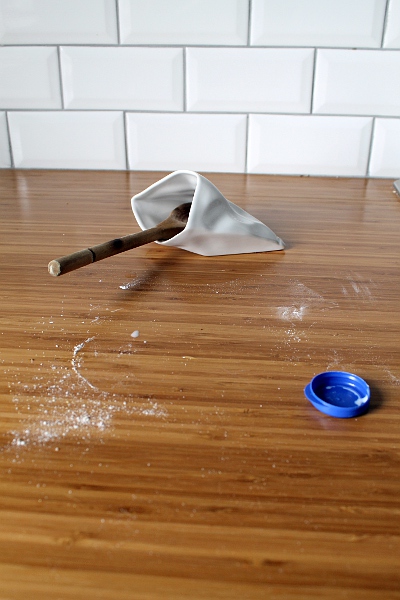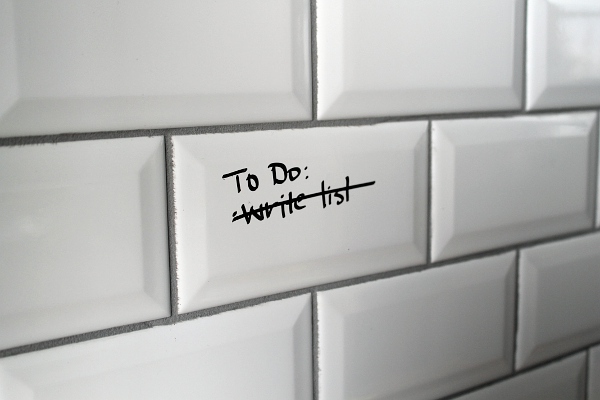If you have been following this blog for any length of time, you’ll know that Emma at The Gift Shed is a regular provider of notebooks, link-er to interesting articles and commenter. In addition to her paper-wizardry, Emma also runs a gardening business, and when I found myself particularly swamped running Misericordia and Killer Pilates, I asked Emma for some advice.
She very kindly sent me a very useful email and then followed it up with a guest blog post with lots of lovely tips for people running too many businesses or who are just looking for better organisational living.
I’ve popped in a few photos here and there, but I’ll hand you over to Emma for the really useful stuff:
Back in October (yes, October) Katy asked me if I had any advice on running two businesses without losing my mind. Apparently my advice was helpful because she then asked me if I’d write a guest post about it.
Life got a bit hectic here (new dog, major building work to our house…) and I clean forgot about it until she reminded me at the end of March. So here we are, almost at the end of April, and I’m finally getting around to putting some advice down on paper. I’ll be honest, I’d have forgotten again (because it wasn’t on my list – this is very important) if another friend hadn’t asked me for some time management tips.
Truth be told I’m not naturally an organised person. My default state is to gently drift through life, littering my path with things that I’ve not got round to tidying away. However I learned very early on that this was no way to live, and certainly no way to run a business (let alone two), so I made changes to the way that I think.
That’s all it is really, altering the way you approach things. The friend who recently asked for time management advice said “It’s anathema to me. Always has been but getting pissed off with being caught out by it! Giving myself a hard time and still getting nothing done!”
So this article is more focused on time management in general than aimed specifically at running two businesses successfully, but the two go very much hand in hand.
Let’s leap straight in with a list of key points, which are here in no particular order.
- Make a list. I love making lists, and there’s something very satisfying about crossing things off a list as they get done. I don’t seem to get as much done if I don’t have a list, it really does help me to stay focused.

- Give yourself easy wins. Don’t just put “clean the house” or “sort out the filing” – if you know a task is big or time consuming (and thus, usually, undesirable) then break it down into smaller chunks. So “clean the house” can be divided up by room or by type (“vacuuming” “dusting” etc.), and “sort out the filing” can be done by month instead. If you’re able to check things off at regular intervals then you’ll feel better about it. It’s a con, but it works.
- Be realistic. Sometimes there’s an almost endless list of things that need to be done. If you have a lot to do then just accept that you won’t get it all done, and stop worrying about it. This goes back to the easy win strategy. Prioritise a few things and get those done, and then anything else is a bonus. I believe that we put unnecessary strain on ourselves by trying to live up to the idea that everything has to be done right now.
- Learn to say no. Really, this is quite a big one and I have taught myself to say no due because of work, but it applies just as much at home. If you’re good at your job then you will be in demand – but if you half kill yourself trying to fit too much in then you’ll end up resenting your work, and there’s also a fair chance that you’ll end up being not so good at what you do because you’re cutting corners trying to fit everything in.
I split my time between garden maintenance and working in my studio. For me this works best if I have a small number of regular gardening clients (and thus a regular income which I can budget around), and I can then take on one-off jobs if they come up and it fits in with my existing work.
I’m not looking to take on any more regular clients at the moment, so no matter how tempting they sound I simply say no. I could fit more work in, but it would cut into my studio time, and that’s just not acceptable to me. Or I could fit the work in without sacrificing time in the studio but would end up with little leisure time. Also unacceptable. This goes back to the point about being realistic.
- Multitask. It sounds obvious, but you’d be surprised at how many people don’t make the most of their time. Most tasks have dead time, when you’re basically waiting for something to happen, so use that time. If I’m waiting for the kettle to boil then I’ll do something else while I’m waiting – if it’s just putting some dishes away then so be it, that’s one less thing to do later.
When I go down to the studio in the morning it takes five minutes for the computer to boot up and for the light to get properly bright, so I go in and switch everything on and then go out to the garden and water some pots. If I’m going out to walk the dog I’ll take a bag of rubbish (or even just a couple of bottles for recycling) down with me. If I’m going from the sitting room to the kitchen then I pick up any mugs or glasses and take them through with me. This all sounds patently obvious to me (and possibly to you, too), but apparently not everyone does this. I do it on autopilot, if I’m getting up to do something then part of me thinks “ok, I’m going in that direction, is there anything I can take with me?” – no journey is wasted! It has to be said that this habit partly evolved through laziness…why make three separate trips upstairs when I can just make one?
I multitask in other ways too, the main one being that I knit/crochet/embroider/blog while watching television. This allows me to get in some leisure craft time while still unwinding in front of a show, and also stops me falling asleep while watching.
- Scheduling. I don’t think this is the best word to describe this bit, but I couldn’t think of anything better. As I run two businesses, and I work for myself, it’s entirely up to me when I go to work. Over the past year or so I’ve tried to work week on/week off. Which means that I’ll see all my garden clients one week and then have the following week in the studio. Of course it doesn’t always work out quite like that (the wonderful British weather can play havoc!), but it does mean that I have breathing room and am still able to comfortably split my time between my two jobs.
If I have appointments for non-work things then I’ll try and book them all for the same day, even if that means waiting a while, as it’s more efficient to write off a whole day than to give up two or three mornings/afternoons for separate appointments.

On the domestic front I also tend to spend a whole morning or afternoon batch cooking things that I can freeze and then just stick in the oven as needed. It might sounds like a lot of time to spend cooking, but it takes pretty much the same amount of time to make a huge batch of pasta sauce (or a pie, or gumbo, etc.) as it does to make enough for one meal, so why not just make a few things at once and get it over and done with. I certainly enjoy meals a lot more when I can just put them in to heat up rather than having to slave over them after a busy day at work, and overall it saves me a lot of time.
I’m trying to think of other examples which might be helpful, but actually I’m struggling because the way you manage your own time is very personal. If you’re really struggling to think where you could save time then make a list (ha!) for a few days detailing what exactly it is you do. List everything, no matter how insignificant you think it is, then look back at the list at the end of the day and see if there are things you could have combined in order to free up time.
My life since November has been very different as we now have a dog, and thus my usual habits are having to be adjusted to accommodate his needs as well as mine. It’s working out well though, and we’re just about into a regular routine. I also had two months when it was almost impossible to do because major work was taking place in my house and half my things were in storage, but I just accepted that and thought of it as a two month hiatus. I spent a lot of that time thinking of ideas and planning projects for later this year (and when I did manage to get some work done in my studio I considered it a happy bonus!). If I had worried about getting lots done while the builders were here then I’d have driven myself mad with stress, but being realistic about it made the whole thing much easier.
So there you have it, my tips for coping when you’ve got too much on your plate. Not the most well-written thing I’ve ever produced, but I’ve really found it quite difficult to put onto paper that which I do on autopilot. I hope you’ll find it useful.
Thanks Emma! Let me know how to get on with these, I’m trying to embrace batch cooking (The aftermath of my Week 1 attempt being shown above – along with the pride of my heart, my chip paper spoon rest) and being realistic. If you have any other useful tips we’d love to have them in the comments!
